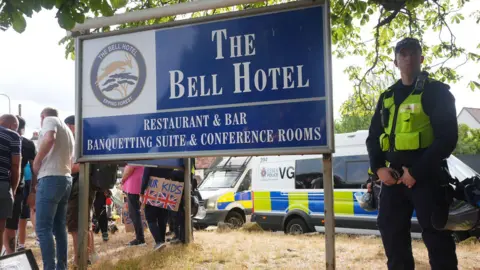A wave of protests against migrant hotels is set to spread across major UK cities this Bank Holiday weekend, with campaigners emboldened by a High Court decision that ordered asylum seekers to be removed from The Bell Hotel in Epping.
The landmark ruling came after Epping Forest Council argued that the hotel had breached planning rules by housing migrants rather than paying guests. Mr Justice Eyre’s decision means the site, which has been at the centre of heated demonstrations, will be emptied by 12 September.
The Bell Hotel became symbolic of the growing row over asylum accommodation after a resident was charged with sexually assaulting a teenage girl, allegations he denies. Protests quickly followed, and campaigners are now planning at least 27 further demonstrations across the UK this weekend.
Anti-racism groups have warned that towns and cities could see the most significant unrest since last year’s riots, as tensions over asylum housing continue to escalate.
Councils of all political colours are now pushing back. Labour-controlled Wirral and Tamworth have indicated they are exploring legal action, joining Conservative-led councils encouraged by party leader Kemi Badenoch to follow Epping’s example. She described the ruling as “a victory for local people led by a good Conservative council”.
Responding, a Labour spokesperson said: “This is desperate and hypocritical nonsense from the architects of the broken asylum system. Under the Tories, the number of asylum hotels rose to 400. There are now half that, and 20,000 fewer asylum seekers in hotels than at their peak.”
The Home Office warned the ruling could fuel further violent protests but admitted it is under pressure to find alternative accommodation for the more than 30,000 asylum seekers currently housed in hotels. Up to 138 migrants are due to leave The Bell Hotel in the coming weeks.
While some councils are preparing legal challenges, Brighton and Hove City Council rejected the approach, stating it was a “proud city of sanctuary” that would continue to support asylum seekers. Deputy leader Jacob Taylor warned that disclosing hotel locations risked “causing division and unrest”.
The Local Government Association has called on the Home Office to work “much more closely” with local authorities on asylum accommodation decisions, as district and borough councils rather than counties hold the legal authority to act.


